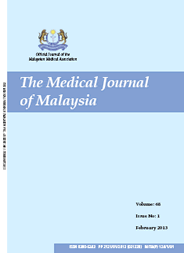MJM, Vol 70 Supplement 1 September 2015
Older people improving their mental health by
taking up physical exercise
*Julius Centre University of Malaya, Department of Social and Preventive Medicine, Faculty of Medicine, University of Malaya, Malaysia, **Department of Oral Pathology, Oral Medicine and Periodontology, Faculty of Dentistry, University of Malaya, Malaysia, ***Fitness First Malaysia, Malaysia, ****Centre for Education and Research on Ageing, Concord Hospital, Concord, NSW, Australia, *****Sydney School of Public Health, University of Sydney, Sydney, NSW, Australia
ABSTRACT
The prevalence of depression in older people is high, pharmacological treatment is expensive and inadequate creating a substantial burden. This is public health priority for which exercise has been proposed as a therapeutic strategy. Interventions that either delay the onset of poor mental health or attenuate its severity potentially have cascading benefits to older people, their families and society. This study aims to develop and evaluate the effectiveness of a multicomponent Exercise and theRApeutic lifeStyle (CERgAS) intervention program targeted at improving physical and mental health as well as maintaining independent living as compared to general health education among older people in an urban poor setting in Malaysia. This cluster randomised controlled trial is a 6-week community-based intervention programme for older people aged 60-years and above from urban poor settings. A total of 164 eligible participants were recruited from 8 clusters (low-cost public subsidised flats) and randomised to the intervention (n = 82) and control arm (n = 82). This study was underpinned by the Health Belief Model with an emphasis towards self-efficacy. The intervention comprise of multicomponent group exercise sessions, nutrition education, oral care education and on-going support and counselling. These was complemented with a kit containing practical tips on exercise, nutrition and oral care after each session. Data were collected over four time points; at baseline, immediately post-intervention, 3-months and 6-months follow-up. Findings from this trial will potentially provide valuable evidence to improve physical and mental health among older people from low-resource settings. This will inform health policies and identify locally acceptable strategies to promote healthy aging among older Malaysian adults.
